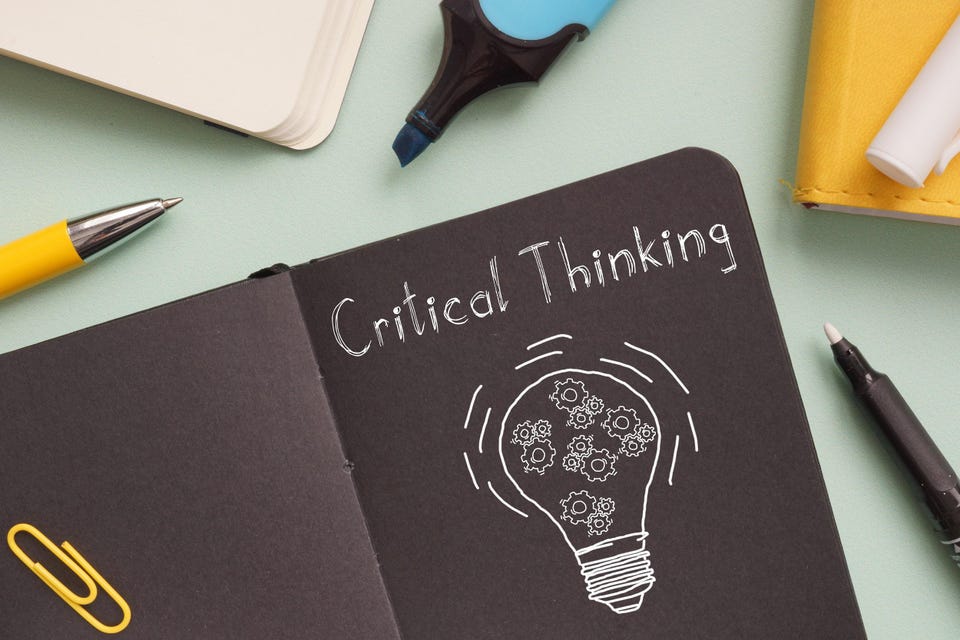Enterprise Tech 13 Easy Steps To Improve Your Critical Thinking Skills Bernard Marr Contributor Opinions expressed by Forbes Contributors are their own. New! Follow this author to improve your content experience. Got it! Aug 5, 2022, 02:23am EDT | New! Click on the conversation bubble to join the conversation Got it! Share to Facebook Share to Twitter Share to Linkedin With the sheer volume of information that we’re bombarded with on a daily basis – and with the pervasiveness of fake news and social media bubbles – the ability to look at evidence, evaluate the trustworthiness of a source, and think critically is becoming more important than ever.
This is why, for me, critical thinking is one of the most vital skills to cultivate for future success. 13 Easy Steps To Improve Your Critical Thinking Skills Adobe Stock Critical thinking isn’t about being constantly negative or critical of everything. It’s about objectivity and having an open, inquisitive mind.
To think critically is to analyze issues based on hard evidence (as opposed to personal opinions, biases, etc. ) in order to build a thorough understanding of what’s really going on. And from this place of thorough understanding, you can make better decisions and solve problems more effectively.
To put it another way, critical thinking means arriving at your own carefully considered conclusions instead of taking information at face value. Here are 13 ways you can cultivate this precious skill: 1. Always vet new information with a cautious eye.
Whether it’s an article someone has shared online or data that’s related to your job, always vet the information you’re presented with. Good questions to ask here include, “Is this information complete and up to date?” “What evidence is being presented to support the argument?” and “Whose voice is missing here?” 2. Look at where the information has come from.
Is the source trustworthy? What is their motivation for presenting this information? For example, are they trying to sell you something or get you to take a certain action (like vote for them)? MORE FOR YOU The 5 Biggest Technology Trends In 2022 ‘Enthusiastic Entrepreneurs’: Pre-IPO Statements On Profitability Prove To Be Larger Than Real Life The 7 Biggest Artificial Intelligence (AI) Trends In 2022 3. Consider more than one point of view. Everyone has their own opinions and motivations – even highly intelligent people making reasonable-sounding arguments have personal opinions and biases that shape their thinking.
So, when someone presents you with information, consider whether there are other sides to the story. 4. Practice active listening.
Listen carefully to what others are telling you, and try to build a clear picture of their perspective. Empathy is a really useful skill here since putting yourself in another person’s shoes can help you understand where they’re coming from and what they might want. Try to listen without judgment – remember, critical thinking is about keeping an open mind.
5. Gather additional information where needed. Whenever you identify gaps in the information or data, do your own research to fill those gaps.
The next few steps will help you do this objectively… 6. Ask lots of open-ended questions. Curiosity is a key trait of critical thinkers, so channel your inner child and ask lots of “who,” “what,” and “why” questions.
7. Find your own reputable sources of information, such as established news sites, nonprofit organizations, and education institutes. Try to avoid anonymous sources or sources with an ax to grind or a product to sell.
Also, be sure to check when the information was published. An older source may be unintentionally offering up wrong information just because events have moved on since it was published; corroborate the info with a more recent source. 8.
Try not to get your news from social media. And if you do see something on social media that grabs your interest, check the accuracy of the story (via reputable sources of information, as above) before you share it. 9.
Learn to spot fake news. It’s not always easy to spot false or misleading content, but a good rule of thumb is to look at the language, emotion, and tone of the piece. Is it using emotionally charged language, for instance, and trying to get you to feel a certain way? Also, look at the sources of facts, figures, images, and quotes.
A legit news story will clearly state its sources. 10. Learn to spot biased information.
Like fake news, biased information may seek to appeal more to your emotions than logic and/or present a limited view of the topic. So ask yourself, “Is there more to this topic than what’s being presented here?” Do your own reading around the topic to establish the full picture. 11.
Question your own biases, too. Everyone has biases, and there’s no point pretending otherwise. The trick is to think objectively about your likes and dislikes, preferences, and beliefs, and consider how these might affect your thinking.
12. Form your own opinions. Remember, critical thinking is about thinking independently.
So once you’ve assessed all the information, form your own conclusions about it. 13. Continue to work on your critical thinking skills.
I recommend looking at online learning platforms such as Udemy and Coursera for courses on general critical thinking skills, as well as courses on specific subjects like cognitive biases. Read more about critical thinking and other essential skills in my new book, Future Skills: The 20 Skills & Competencies Everyone Needs To Succeed In A Digital World . Written for anyone who wants to surf the wave of digital transformation – rather than be drowned by it – the book explores why these vital future skills matter and how to develop them.
Follow me on Twitter or LinkedIn . Check out my website or some of my other work here . Bernard Marr Editorial Standards Print Reprints & Permissions.
From: forbes
URL: https://www.forbes.com/sites/bernardmarr/2022/08/05/13-easy-steps-to-improve-your-critical-thinking-skills/



